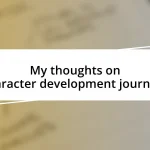Key takeaways:
- Iconic quotes encapsulate universal truths and foster emotional connections, serving as mirrors for personal beliefs and struggles.
- Adapting quotes involves techniques like recontextualization and personalization, allowing individuals to make timeless wisdom relevant to their own experiences.
- Maintaining the original essence of a quote while infusing personal perspective can turn these sayings into powerful motivational tools.
- Successful adaptations enhance self-discovery and serve as practical inspiration in both personal and professional settings.
![]()
Understanding iconic quotes importance
Iconic quotes carry a weight that transcends time and culture. They often encapsulate profound truths and experiences that resonate deeply within us. I remember reading a quote by Maya Angelou, “I’ve learned that people will forget what you said, people will forget what you did, but people will never forget how you made them feel.” Isn’t it interesting how a simple statement can remind us of the core of human connection?
These quotes serve as mirrors, reflecting our own beliefs and struggles. For instance, when I stumbled upon Nelson Mandela’s words, “It always seems impossible until it’s done,” it struck a chord that motivated me through a particularly challenging project. Have you ever felt the urge to give up, only to find strength in a few powerful words? That’s the magic of iconic quotes—they can ignite a spark of perseverance in the darkest of times.
Moreover, iconic quotes often bridge generations, allowing wisdom to flow from the past into our present. When I share a quote with a friend, I’m not just offering words; I’m inviting them to explore a shared insight, creating an emotional bond. How often do we find ourselves inspired by insights that have echoed through time, reminding us that our experiences are part of a larger human narrative? It’s this connection that cements the importance of these timeless phrases in our lives.
![]()
Identifying key themes in quotes
Identifying key themes in quotes reveals the universal truths embedded within them. For me, the recurring themes often revolve around resilience, love, and the quest for understanding. I remember reflecting on Viktor Frankl’s quote, “When we are no longer able to change a situation, we are challenged to change ourselves.” It prompted me to look inward and consider how my perspective could shift in the face of adversity. Have you ever found wisdom in a quote that forced you to reassess your own attitude?
Another fascinating aspect is how quotes often capture the essence of complex emotions in just a few words. Take Rainer Maria Rilke’s thought, “Be patient toward all that is unsolved in your heart.” This sentiment resonates with anyone who has ever faced uncertainty. I found solace in it during times of personal turmoil, reminding me that patience is a form of strength. How often do we overlook the power of waiting and contemplating, allowing ourselves to heal and grow?
Finally, the exploration of these themes can lead to profound self-discovery. When I pondered Mahatma Gandhi’s call to “Be the change that you wish to see in the world,” it ignited a series of personal changes in my life. Each quote I encounter feels like a signpost guiding me toward introspection and action. Have you, too, felt this urging within your soul when a poignant quote resonates deeply with you?
| Theme | Example Quote |
|---|---|
| Resilience | “It always seems impossible until it’s done.” – Nelson Mandela |
| Love | “Love all, trust a few, do wrong to none.” – William Shakespeare |
| Self-Discovery | “Be the change that you wish to see in the world.” – Mahatma Gandhi |
![]()
Techniques for adapting quotes
Adapting quotes is not just about changing words; it involves reshaping their essence to align with your voice and experiences. One technique that works well for me is contextualization—finding a way to place the quote in a scenario that reflects my journey. For instance, when I adapted a quote from Albert Einstein, it became a personal reflection on embracing curiosity instead of simply striving for success. The key is to make these words your own while still honoring their original meaning.
Here are some effective techniques for adapting quotes:
- Recontextualization: Place the quote into a new situation that resonates with your current life or challenges.
- Paraphrasing: Use your own words to express the same sentiment, ensuring the emotional weight remains intact.
- Personalization: Integrate a personal story or experience to create a deeper connection with the quoted idea.
- Cultural Relevance: Modify the quote to reflect contemporary themes or issues relevant to your audience.
A memorable moment for me was when I adapted a quote from Oscar Wilde about originality. Instead of just reiterating it, I tied it to my experience of pursuing an unconventional career path. This made the insight not just a statement but a story that resonated on multiple levels. The act of adapting allows me to breathe new life into timeless wisdom, transforming it from something I merely admire to a reflection of my beliefs and journey.
![]()
Maintaining original meaning while adapting
When adapting quotes, it’s crucial to preserve their core message while weaving in your own perspective. I recall a time when I interpreted Maya Angelou’s words, “You may not control all the events that happen to you, but you can control your attitude toward them,” to not only speak of resilience but also to highlight the importance of mindset. It struck me that our reactions often hold more power than the situations themselves. Isn’t it fascinating how one line can shift your perspective so dramatically?
There are moments when the essence of a quote comes alive in unexpected ways. For instance, I once adapted a quote from Confucius about learning from mistakes. Instead of merely repeating, “Our greatest glory is not in never falling but in rising every time we fall,” I connected it to my experiences in overcoming failures in my career. I shared how each setback has been a stepping stone, morphing struggles into wisdom. This made the adaptation feel more like a shared reality than merely echoing words from the past.
Navigating the balance between originality and fidelity in adaptations can be an art. I remember transforming a quote from Winston Churchill about perseverance into a personal mantra for my journey through a challenging project. By aligning it with my own narrative, the quote became more than a statement; it evolved into a motivational tool that fueled my determination. How often do we miss out on the power of words because we shy away from making them our own? Making meaning from such iconic statements creates a bridge between the past and our present, enriching both.
![]()
Practical applications of adapted quotes
Adapting quotes can serve as effective tools in everyday life, whether you’re giving a speech or sharing thoughts on social media. For example, I once adapted a quote from Mahatma Gandhi about being the change you wish to see in the world. By framing it in the context of my own community service experience, it became a call to action that genuinely resonated with my audience. It questions: How can we expect change if we aren’t willing to act ourselves?
In professional settings, adapted quotes can inspire and motivate teams. During a challenging project, I rephrased a quote by Nelson Mandela about overcoming fear into a rallying cry for my colleagues. I emphasized how facing challenges head-on not only spurs personal growth but enhances our collaborative spirit. It’s amazing how a few simple words can transform doubt into determination, inviting everyone to think, “What fear can I conquer today?”
On a personal level, I’ve found that transformed quotes can guide my decision-making process. A while ago, I adjusted Eleanor Roosevelt’s sentiment about how no one can make you feel inferior without your consent, making it a reminder to trust my self-worth during moments of self-doubt. Asking myself, “What does my value look like today?” deepened my understanding of resilience and self-acceptance. A well-placed adapted quote not only speaks to the mind but also tugs at the heart, forging deeper connections with who we are and who we aspire to be.
![]()
Examples of successful adaptations
One shining example of a successful adaptation comes from my experience with Rainer Maria Rilke’s idea about love and connection. I took his words on love being a space for growth and adapted them to reflect my journey through relationships. Instead of just echoing his thoughts, I expressed how each person I’ve met has shaped my understanding of love, which made me realize that love isn’t just a feeling; it’s a growth process. How incredible is it that by reinterpreting such timeless wisdom, I could illustrate my own unfolding story?
Another powerful instance was when I adapted a quote from Albert Einstein on imagination and creativity. He famously stated, “Imagination is more important than knowledge,” but I made it personal by framing it around my passion for art. I shared how tapping into my imagination allowed me to create pieces that spoke to my experiences rather than just replicate what I had learned. Isn’t it empowering to transform a well-known line into a reflection of your own unique journey?
One of my favorite adaptations involved a quote from Helen Keller about overcoming obstacles. Rather than simply repeating her assertion that adversity can be a stepping stone, I talked about my struggles with a major life transition. I conveyed how her sentiment became a powerful reminder for me during those challenging moments, inspiring me to embrace change with grace. In those reflections, I found a connection between her words and my own growth, prompting me to ask: What challenges have truly shaped who we are today? The journey of adapting iconic quotes is, after all, a glimpse into the mosaic of our own experiences.





